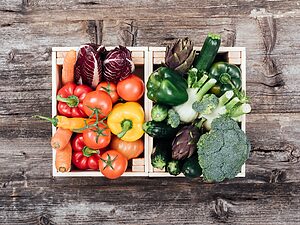All fruits, vegetables, and tubers are organic in nature. Meaning they are composed of carbon-hydrogen compounds. Like humans, who are organic beings with material bodies that degrade and decompose in the soil, much like a banana peel.
If Everything Edible Is Organic, What Differentiates One Vegetable from Another?
Over time, many organic substances have been transformed into inorganic ones. What was once natural has been processed, and conventional farming has turned into massive industrial farming, burdened by environmental pressures. Going to the supermarket becomes overwhelming due to the endless array of biological and ecological labels, which are often just marketing tools.
Organic foods, which are sold at a higher price in some supermarkets, have an “organic” certification due to their cultivation method that does not use agro-chemicals, making them less industrialized. This certification costs producers a significant amount of capital, making it reasonable to pay a higher price for these products. Look for labels that indicate USDA 100% organic, as terms like natural and ecological do not guarantee what we seek.
What Are We Looking For?
Non-agroecologically grown vegetables are subjected to endless fertilizations and pesticides, harming the environment and potentially human health. Intensive farming degrades the soil and becomes less profitable for small farmers over time.
Both types of vegetables will have the same physicochemical properties, but no conclusive studies are proving that sustainably grown vegetables have higher nutritional value. However, it is proven that agrochemicals can cause cancer and disrupt hormones.
“20% of agrochemicals used in the agricultural industry are considered cholinesterase inhibitors” (enzymes that enable nerve transmission). (Pozzy, 2021)
The main importance of consuming organically produced food is the ability to maintain production systems for a longer time, as they depend on soil quality. Organic farming nourishes the soil, while conventional farming degrades it. We must keep the soil alive, an ancient thought that has faded over time but needs to be revived to keep the planet’s systems functioning for longer.
A living soil captures carbon, an organic soil. A degraded soil, on the other hand, emits gases like nitrous oxide and depends on the system.
“Agricultural activities significantly contribute to greenhouse gases causing global warming, but they can also mitigate it through atmospheric carbon sequestration in the form of organic carbon in the soil” (Toirkens, et al, 2018).
Finally, another important aspect we must consider as intelligent consumers is that organic companies or farms generally treat their employees better compared to large-scale conventional agriculture where workers are often undervalued. They endure extreme conditions, injuries, sharp leaves, tall branches, and constant contact with harmful chemicals. This harsh labour makes them mere tools for agricultural transactions, and in their old age, they are treated as disposable.
Employees in these conventional settings often work under extreme conditions, facing scratches, sharp leaves, and tall branches, and are constantly exposed to chemicals that harm their health. This is a significant factor that personally drives me to purchase organic products over conventional vegetables. Beyond the price and soil quality, what we seek is human well-being.
References:
Pozzi, S. (n.d.). The most pesticide-contaminated foods in Argentina that we eat every day. http://Www.carbono.news. Retrieved March 29, 2022, from https://www.carbono.news/salud-y-alimentacion/los-alimentos-mas-contaminados-con-agrotoxicos-de-argentina-que-comemos-todos-los-dias/
Carbon sequestration in soils. (2018, January 2). Redagrícola Chile. https://www.redagricola.com/cl/el-secuestro-de-carbono-en-los-suelos/
https://www.redagricola.com/cl/el-secuestro-de-carbono-en-los-suelos/


